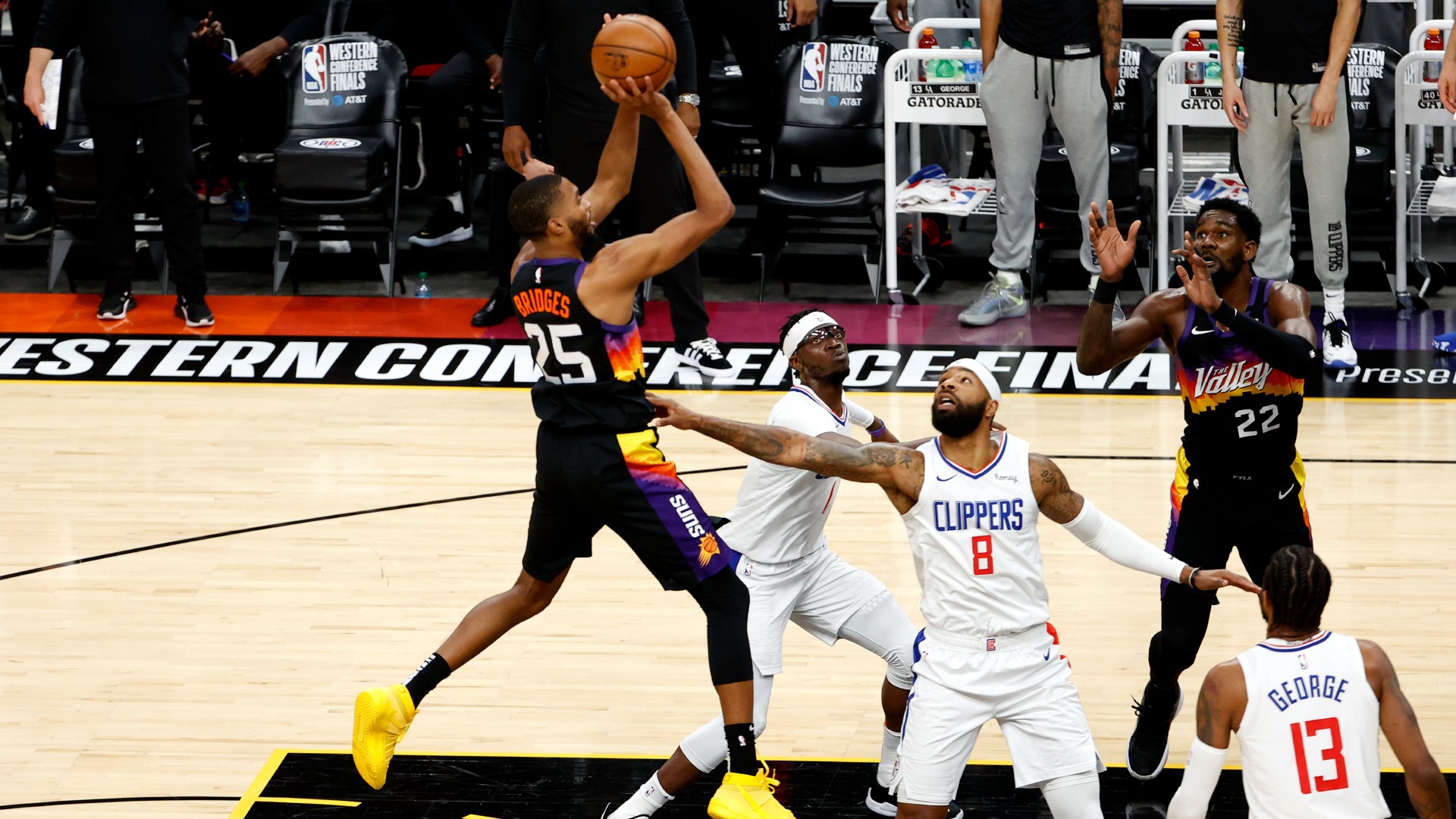
Cameron Johnson was nearly four months past his 23rd birthday on the June evening in 2019 when the Suns selected him with the 11th overall pick in the NBA Draft. The reaction to that choice might have convinced you Johnson would then be searching for housing in one of the Phoenix area’s many lovely senior communities.
Mikal Bridges, chosen by the Sixers with the 10th pick a year earlier but acquired by the Suns in a trade, wasn’t exactly a child when he entered the league. He was only 21 at the draft but turned 22 well before opening night.
When Johnson was chosen, the Suns were blistered with criticism for drafting a player of such advanced age. The Salt Lake Tribune gave the pick a C- grade, the same as NBADraft.net. Bleacher Report assigned the pick a D+ and called Johnson “the anti-upside prospect of this draft.” There was less antipathy for the Bridges pick, mostly Bs, but CBS Sports gave the acquisition a C- because it meant trading away “high-upside” teen Zhaire Smith.
Now, Smith has scored 48 NBA points in three years, and the Suns are two games away from the NBA Finals. As they’ve won 10 of their 13 playoff games to date, Johnson has averaged 21 minutes per game, 7.8 points and 42 percent shooting from long distance. Bridges is starting and averaging 33 minutes, 11.7 points while shooting 46 percent from the field.
There is a reason James Jones was named the NBA’s Executive of the Year.
Actually, there are many, but one is that he declined to listen to the trope that drafting teens is the only way to go. The Suns obviously are aware there is nothing wrong with selecting highly qualified 19-year-olds. They chose 7-1 DeAndre Ayton out of Arizona first overall in that 2018 draft, and he is averaging 20.7 points and 10.7 rebounds in these playoffs. He was 19 on draft day and played his rookie season at age 20.
RELATED: Suns’ Booker gets mask advice from Richard Hamilton
Of the top eight players in the Suns rotation, only All-Star wing Devin Booker played his first NBA season as a teenager. The average age of those players in their rookie years: 21.1.
Now you have a publication with SB Nation’s reach posting articles such as the one headlined: “The Suns go as Mikal Bridges and Cameron Johnson go”.
When Stock Market Pioneer wrote about the fixation with draft age around the 2020 All-Star break, when the leading U.S. scorer in the Rising Stars game was 23-year-old rookie Eric Paschall, we quoted an Eastern Conference NBA executive explaining this phenomenon as being largely the product of analytics, with statistics indicating draft age is the most important predictor of future player success.
Allowing something as intangible as talent acquisition to be run primarily by numbers, though, has not led to ideal outcomes. “On the surface, it’s a good idea, but the majority of guys just aren’t ready,” the executive explained. “So that’s why you see all these guys get traded.”
Just four years after the 2016 draft, 20 of the 30 first-round picks no longer were with their original teams. Of the 10 that were, only Denver’s Jamal Murray had played his rookie season as a teen, and 21 was the average rookie-season age of players who stuck with their first teams. You know, that right there is a form of analytics, too.
Indeed, we’ve learned this week that even when a teenaged draft pick does prove to be prepared, his original team still might be interested in shipping off that player. If you’re ready to be very good but not elite – say, if you’re Colin Sexton rather than Trae Young – your team might be placing you on the trading block a few years into your career.
Young and Sexton were the top point guards in the 2018 draft. Young was the fifth overall pick and has been a sensation, leading the Hawks to the Eastern Conference finals this season. Sexton has been exceptionally productive, from averaging 16.7 points as a rookie to 24.3 points on 47.5 percent shooting in his third season. Now we discover, according to Sports Illustrated, the Cavaliers are looking into trade scenarios for Sexton because he could demand a max contract, and the Cavs don’t want to offer such a deal.
So many teams don’t want to draft 20-somethings because they supposedly don’t have the requisite “upside”, but teens that do prove to have upside must deliver at a superstar level or they might not be worth the bother.
This is why the James Jones approach has worked so well, and why the Suns are shining so brightly.
Because the pursuit of championships has been the only concern.
Winning never gets old.
